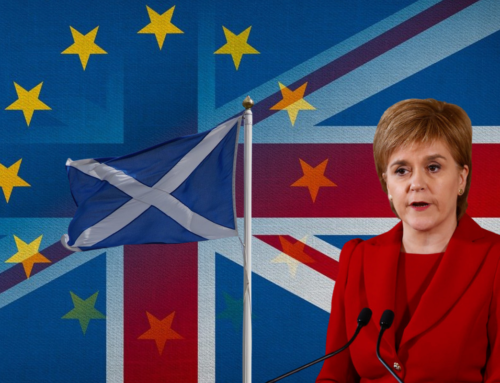
by Brendan Donnelly
Director, The Federal Trust
18th March 2019
UPDATE 25/03/19:
Last week the European Council gave the United Kingdom two further weeks to come up with a plan for avoiding a “no deal” Brexit. It is now up to Parliament to adopt such a plan and make the government adopt it too. If this government remains set on “no deal,” Parliament needs to replace it.
It is frequently claimed that the central flaw of the 2016 European referendum was its failure to clarify the nature of the Brexit for which Leave voters were voting. There is some truth in this analysis, but it does not precisely capture the inadequacy of the result as a basis for subsequent action. Many, probably most, Leave voters had a clear idea of what they thought they were voting for: maintenance of the economic benefits of EU membership, coupled with the disappearance of the legal and political obligations arising from that membership. The Leave campaign spent much time and effort presenting this seductive and dishonest prospectus to the electorate. Indeed, they would not have gained their narrow victory if they had spoken frankly of the unwelcome trade-offs that would inevitably accompany Brexit.
The consequences of this economy with the truth have been dramatic. Since 2016 the whole structure of British political life has come perilously close to self-destruction as its leading figures tried with ever less plausibility to call into being the chimera promised the electorate in the referendum. In a functioning parliamentary system, there would have been many voices to explain to voters they had been persuaded in the referendum to vote for a fantasy. Over the past three years the dysfunctional British political system has been disfigured by the two major parties which have simply competed with each other in promising marginally different versions of the same chimera. The inevitable result has been confusion, paradox and drift.
The past week in Parliament has been an illustrative episode in this self-defeating process. The Prime Minister’s painfully negotiated Withdrawal Agreement (WA) went down again to one of the largest defeats ever suffered by a sitting government; the government found itself instructing its supporters to vote against the motion rejecting “no deal” which it had itself put forward, a motion passed finally with the votes of Labour MPs; nearly two thirds of the Conservative Parliamentary Party voted against the motion of its government seeking an extension to the Article 50 negotiations; the Labour Party abstained on an amendment calling for a People’s Vote less than an hour before its Leader appeared formally to commit the Party to supporting such a vote. Despite these dramatic and often ludicrous events, there is still, less than two weeks before the expiry of the Article 50 deadline, little or no certainty about whether, when or in what circumstances the UK will leave the EU.
Deliberate vagueness
Contrary to widespread reporting the only concrete novelty to emerge from last week is the certainty that if the Prime Minister’s WA is accepted by Parliament before the meeting of the European Council on 21st March then she will ask for a short extension of the Article 50 negotiating period until 30th June for implementing legislation to be adopted by the British Parliament. The Speaker’s statement on procedure of yesterday (18th March) has made this an unlikely eventuality. Theresa May has however strongly implied that if the WA is not adopted before 21st March, she will reluctantly accept a longer extension than three months, without committing herself to any particular period of time or any programme of activity within it. This systematic vagueness is doubtless a conscious tactic of the Prime Minister, who believes it facilitates her task of managing a divided Conservative Party. But it is a recipe for wholesale uncertainty, leaving open the widest range of possible outcomes, including “no deal.”
If, by the beginning of the EU summit, Mrs. May has not persuaded Parliament to accept her deal, it is difficult to predict with any confidence what attitude she or her EU partners will adopt to the impasse. Her most likely initial request might well be to seek an extension of three months to the negotiations in the hope of eventually securing Parliamentary ratification of the WA. The Council might be prepared to accede, in which case the present damaging uncertainty would simply be prolonged until the end of June. Much more likely however is that the EU-27 would be unwilling to grant such an extension in those circumstances There is increasing frustration and irritation throughout continental Europe at the incapacity of the British political system to take clear decisions regarding Brexit, and many Council members will be unconvinced that three months will suffice to overcome this incapacity. It is entirely possible that the Prime Minster will find herself confronted with an uncongenial choice between leaving the EU without an agreement on 29th March or accepting a longer extension, perhaps to the end of the year or even longer. Such a longer extension would certainly imply European Elections would be held in the UK in late May, a prospect to which the main British parties show an irrational hostility; and the extension might well be associated with further conditions such as holding a referendum or general election.
In those circumstances, the Prime Minister’s dilemma would be an impossible one. There is reason to believe that she is aware of the disastrous consequences for the UK arising from Brexit with “no deal,” but her Party would never tolerate a longer postponement of Brexit beyond at the very latest 30th June. Over the past three years, Mrs. May has always chosen the maintenance of Conservative Party cohesion before any other considerations, a choice which has conceded dominance to the ruthless and cohesive European Research Group (ERG). It would be highly surprising if she deviated from this course over the coming days and weeks. An entirely conceivable, indeed likely outcome of this week’s summit is that the Prime Minister returns to London having refused an offer of a longer extension, either because of the (for her) excessive length of the extension stipulated or the conditions associated with it. The Parliamentary week beginning on 25th March would then be a tumultuous one, with Mrs. May presumably attempting to have her WA accepted by Parliament in one last vote days before the “no deal” deadline; and others attempting to mobilise the proven majority of MPs hostile to “no deal” in order to create a way of ensuring the extension voted for by the Commons last week.
Intractable dilemmas
It cannot be taken for granted that such mobilisation will be possible before “B-Day”. It would depend, as always, upon the ability of the heterogeneous Commons majority against “no deal” to agree on a single alternative which would be both legally and politically compelling in the UK and attractive to the European Council. Last week’s Commons votes were marked by unexpected coalitions and fractures within the parties, leading to unexpected outcomes, but with only limited progress towards solution of the intractable dilemmas posed by Brexit. There is every chance that in the final week of March the Prime Minister’s WA will fail to secure approval and Parliament itself will fail to coalesce around a single legislative and political project to prevent “no deal.” Last week’s round of voting was damaging, if not necessarily fatal, to the prospects of Parliamentary backing for a People’s Vote, while the hopes of some that MPs may be prepared at the last moment to revoke the Article 50 notification seem far-fetched. Earlier in the year the prospect of a National Government was the subject of some discussion in Westminster, but that discussion has not been sustained. Since the triggering of Article 50 in March 2017, “no deal” has been the default option. The tribalism of British politics, a weak and divided opposition and the power to manipulate Parliamentary business vested in the executive have all combined to prevent the emergence of any alternative to “no deal” other than the Prime Minister’s “deal”. In negotiating that WA she has of course had the inestimable advantage of access to all the resources of the British government that she heads. No such access can ever be available to Parliament.
Parliament will never be able to negotiate a new Brexit settlement with the EU 27. If it wishes to be sure that “no deal” is genuinely off the table, either at the end of March, or the end of June, it must adopt a clearer strategy for preventing it than it has been able to until now; and it must find a way of imposing that strategy on the government that goes beyond the merely procedural and aspirational.
No accident
If in the circumstances described above the UK leaves the EU on 29th March with “no deal,” there will doubtless be commentators who will describe this traumatic event as having happened “by accident.” This will be an incorrect description. There is an important minority within the Conservative Party actively seeking Brexit with “no deal” and a further tranche of Conservative MPs who are prepared to accept “no deal” rather than acquiesce in the WA on offer. Equally, there are influential Labour MPs, well represented among the Party’s Parliamentary leadership, who regard their own political agenda as well served by Brexit, and who would not be unhappy to see the Conservative government blamed for the economic disruption caused by “no deal.” For these two minorities within the main parties a “no deal” Brexit will certainly be no accident. It is also too generous to speak of an accidental “no deal” in regard to the great majority of MPs from all parties who know that Brexit, whatever form it takes, will be an economic and political disaster for the UK, but have allowed themselves to be cowed into inactivity by the claim of the zealots and charlatans that the result of the 2016 must be “respected.” The delusory result of 2016 cannot be respected, because it is unattainable in reality.
The political contortions, the systematic ambiguities and self-serving delusions of the past three years in British politics all derive from one source, the willingness of the British political class to pretend that a manifest untruth – a cost-free Brexit – can be transmuted into reality by a narrow victory three years ago, a victory based on a questionable franchise and stained by criminality. Those MPs who have participated in this public pretence bear a heavy load of responsibility through their inaction for whatever damaging outcome emerges. It may be that in the coming fortnight they will find the determination and coherence to unify forces around a strategy that can genuinely prevent the Prime Minister from driving the UK off the cliff-edge to “save” Conservative party unity. The restoration of British Parliamentary sovereignty was a concept frequently invoked during the referendum. The years since have underlined that this was simply another empty trope of the “Leave” campaign. During what is left of this month, MPs will, however, have a last opportunity to reclaim their sovereignty against an overbearing and incompetent executive.
Dr. Samuel Johnson famously believed that knowing he was to be hanged in two weeks concentrated a man’s mind “wonderfully.” MPs should abide by that adage in the next fortnight – or risk economic disaster and the break-up of the UK.






